Civil Procedure 2017 Assignment: Court Procedures and Costs
VerifiedAdded on 2020/05/08
|5
|1612
|100
Homework Assignment
AI Summary
This assignment solution addresses key aspects of civil procedure, including court and tribunal jurisdictions, procedures for a stay of proceedings in a civil appeal, and cost recovery calculations. The solution begins by outlining the determination of court jurisdiction based on the High Court Rules 2016, emphasizing the plaintiff's options and the defendant's right to apply for a transfer. It differentiates between the High Court's unlimited jurisdiction and the District Court's monetary limits, and also mentions the Disputes Tribunal. The assignment then delves into a case study involving Waikato Widgets Limited, recommending the District Court for a claim of $220,000. The solution further explains the procedure for a stay of proceedings in a civil appeal, including time limits, required documents, and fees. It analyzes a case study where Wonder Technologies Limited might appeal, discussing the judge's discretion regarding security for costs. The assignment concludes with cost calculations based on Rule 14.3, providing examples of general civil proceedings and case management costs, alongside a discussion of factors considered when granting costs, referencing the ITA 2007 and the R v Hugel case.
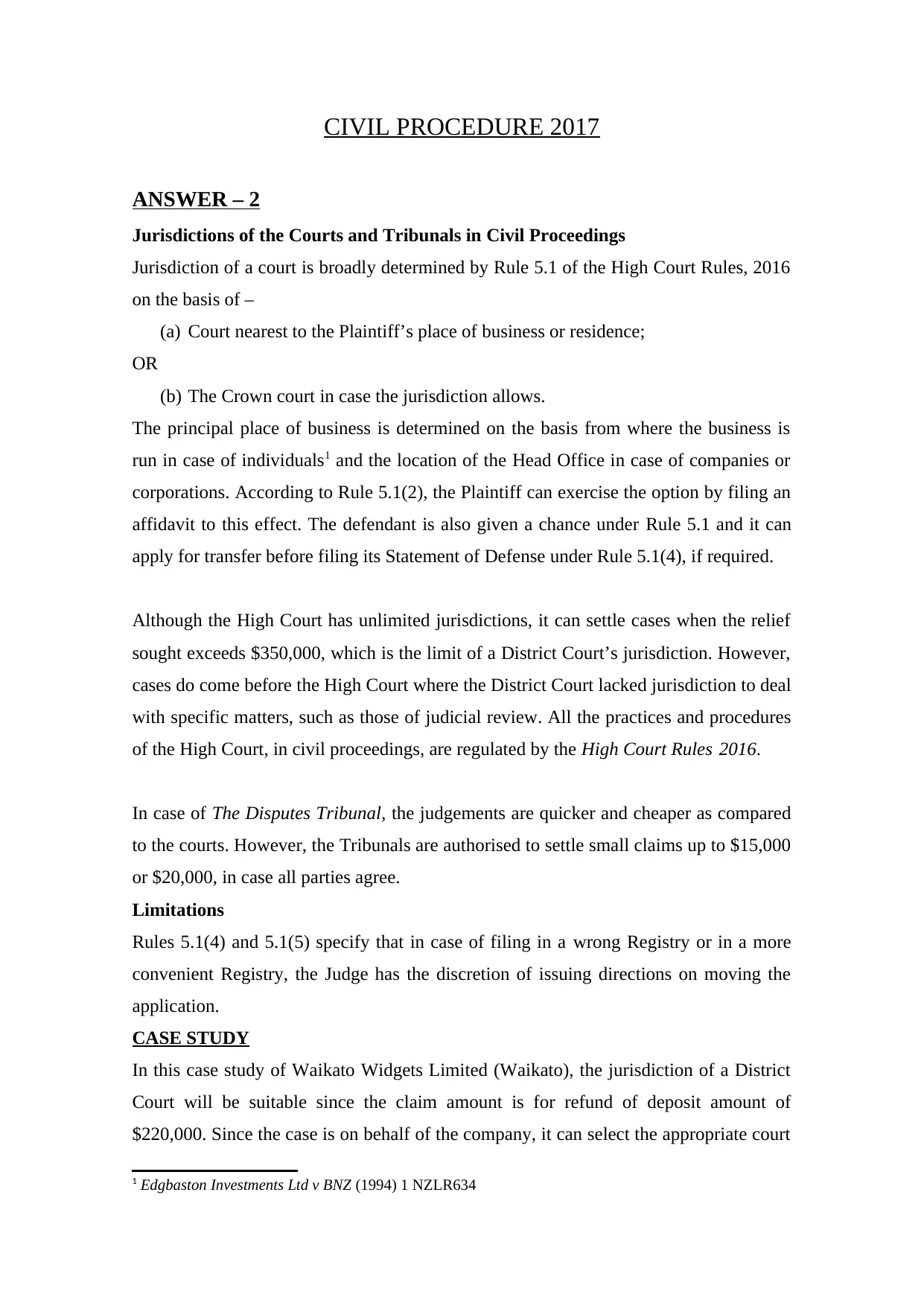
CIVIL PROCEDURE 2017
ANSWER – 2
Jurisdictions of the Courts and Tribunals in Civil Proceedings
Jurisdiction of a court is broadly determined by Rule 5.1 of the High Court Rules, 2016
on the basis of –
(a) Court nearest to the Plaintiff’s place of business or residence;
OR
(b) The Crown court in case the jurisdiction allows.
The principal place of business is determined on the basis from where the business is
run in case of individuals1 and the location of the Head Office in case of companies or
corporations. According to Rule 5.1(2), the Plaintiff can exercise the option by filing an
affidavit to this effect. The defendant is also given a chance under Rule 5.1 and it can
apply for transfer before filing its Statement of Defense under Rule 5.1(4), if required.
Although the High Court has unlimited jurisdictions, it can settle cases when the relief
sought exceeds $350,000, which is the limit of a District Court’s jurisdiction. However,
cases do come before the High Court where the District Court lacked jurisdiction to deal
with specific matters, such as those of judicial review. All the practices and procedures
of the High Court, in civil proceedings, are regulated by the High Court Rules 2016.
In case of The Disputes Tribunal, the judgements are quicker and cheaper as compared
to the courts. However, the Tribunals are authorised to settle small claims up to $15,000
or $20,000, in case all parties agree.
Limitations
Rules 5.1(4) and 5.1(5) specify that in case of filing in a wrong Registry or in a more
convenient Registry, the Judge has the discretion of issuing directions on moving the
application.
CASE STUDY
In this case study of Waikato Widgets Limited (Waikato), the jurisdiction of a District
Court will be suitable since the claim amount is for refund of deposit amount of
$220,000. Since the case is on behalf of the company, it can select the appropriate court
1 Edgbaston Investments Ltd v BNZ (1994) 1 NZLR634
ANSWER – 2
Jurisdictions of the Courts and Tribunals in Civil Proceedings
Jurisdiction of a court is broadly determined by Rule 5.1 of the High Court Rules, 2016
on the basis of –
(a) Court nearest to the Plaintiff’s place of business or residence;
OR
(b) The Crown court in case the jurisdiction allows.
The principal place of business is determined on the basis from where the business is
run in case of individuals1 and the location of the Head Office in case of companies or
corporations. According to Rule 5.1(2), the Plaintiff can exercise the option by filing an
affidavit to this effect. The defendant is also given a chance under Rule 5.1 and it can
apply for transfer before filing its Statement of Defense under Rule 5.1(4), if required.
Although the High Court has unlimited jurisdictions, it can settle cases when the relief
sought exceeds $350,000, which is the limit of a District Court’s jurisdiction. However,
cases do come before the High Court where the District Court lacked jurisdiction to deal
with specific matters, such as those of judicial review. All the practices and procedures
of the High Court, in civil proceedings, are regulated by the High Court Rules 2016.
In case of The Disputes Tribunal, the judgements are quicker and cheaper as compared
to the courts. However, the Tribunals are authorised to settle small claims up to $15,000
or $20,000, in case all parties agree.
Limitations
Rules 5.1(4) and 5.1(5) specify that in case of filing in a wrong Registry or in a more
convenient Registry, the Judge has the discretion of issuing directions on moving the
application.
CASE STUDY
In this case study of Waikato Widgets Limited (Waikato), the jurisdiction of a District
Court will be suitable since the claim amount is for refund of deposit amount of
$220,000. Since the case is on behalf of the company, it can select the appropriate court
1 Edgbaston Investments Ltd v BNZ (1994) 1 NZLR634
Paraphrase This Document
Need a fresh take? Get an instant paraphrase of this document with our AI Paraphraser
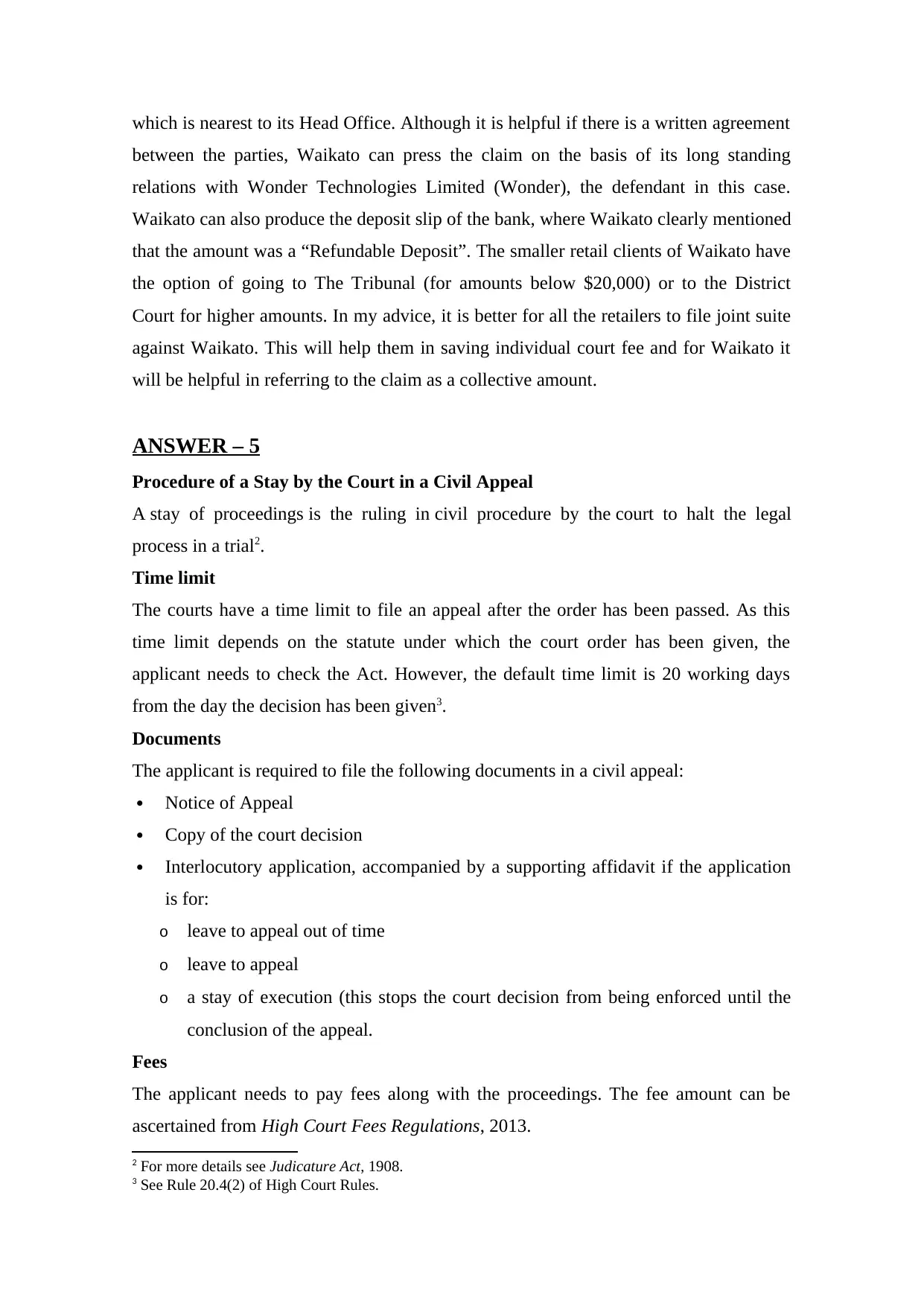
which is nearest to its Head Office. Although it is helpful if there is a written agreement
between the parties, Waikato can press the claim on the basis of its long standing
relations with Wonder Technologies Limited (Wonder), the defendant in this case.
Waikato can also produce the deposit slip of the bank, where Waikato clearly mentioned
that the amount was a “Refundable Deposit”. The smaller retail clients of Waikato have
the option of going to The Tribunal (for amounts below $20,000) or to the District
Court for higher amounts. In my advice, it is better for all the retailers to file joint suite
against Waikato. This will help them in saving individual court fee and for Waikato it
will be helpful in referring to the claim as a collective amount.
ANSWER – 5
Procedure of a Stay by the Court in a Civil Appeal
A stay of proceedings is the ruling in civil procedure by the court to halt the legal
process in a trial2.
Time limit
The courts have a time limit to file an appeal after the order has been passed. As this
time limit depends on the statute under which the court order has been given, the
applicant needs to check the Act. However, the default time limit is 20 working days
from the day the decision has been given3.
Documents
The applicant is required to file the following documents in a civil appeal:
Notice of Appeal
Copy of the court decision
Interlocutory application, accompanied by a supporting affidavit if the application
is for:
o leave to appeal out of time
o leave to appeal
o a stay of execution (this stops the court decision from being enforced until the
conclusion of the appeal.
Fees
The applicant needs to pay fees along with the proceedings. The fee amount can be
ascertained from High Court Fees Regulations, 2013.
2 For more details see Judicature Act, 1908.
3 See Rule 20.4(2) of High Court Rules.
between the parties, Waikato can press the claim on the basis of its long standing
relations with Wonder Technologies Limited (Wonder), the defendant in this case.
Waikato can also produce the deposit slip of the bank, where Waikato clearly mentioned
that the amount was a “Refundable Deposit”. The smaller retail clients of Waikato have
the option of going to The Tribunal (for amounts below $20,000) or to the District
Court for higher amounts. In my advice, it is better for all the retailers to file joint suite
against Waikato. This will help them in saving individual court fee and for Waikato it
will be helpful in referring to the claim as a collective amount.
ANSWER – 5
Procedure of a Stay by the Court in a Civil Appeal
A stay of proceedings is the ruling in civil procedure by the court to halt the legal
process in a trial2.
Time limit
The courts have a time limit to file an appeal after the order has been passed. As this
time limit depends on the statute under which the court order has been given, the
applicant needs to check the Act. However, the default time limit is 20 working days
from the day the decision has been given3.
Documents
The applicant is required to file the following documents in a civil appeal:
Notice of Appeal
Copy of the court decision
Interlocutory application, accompanied by a supporting affidavit if the application
is for:
o leave to appeal out of time
o leave to appeal
o a stay of execution (this stops the court decision from being enforced until the
conclusion of the appeal.
Fees
The applicant needs to pay fees along with the proceedings. The fee amount can be
ascertained from High Court Fees Regulations, 2013.
2 For more details see Judicature Act, 1908.
3 See Rule 20.4(2) of High Court Rules.
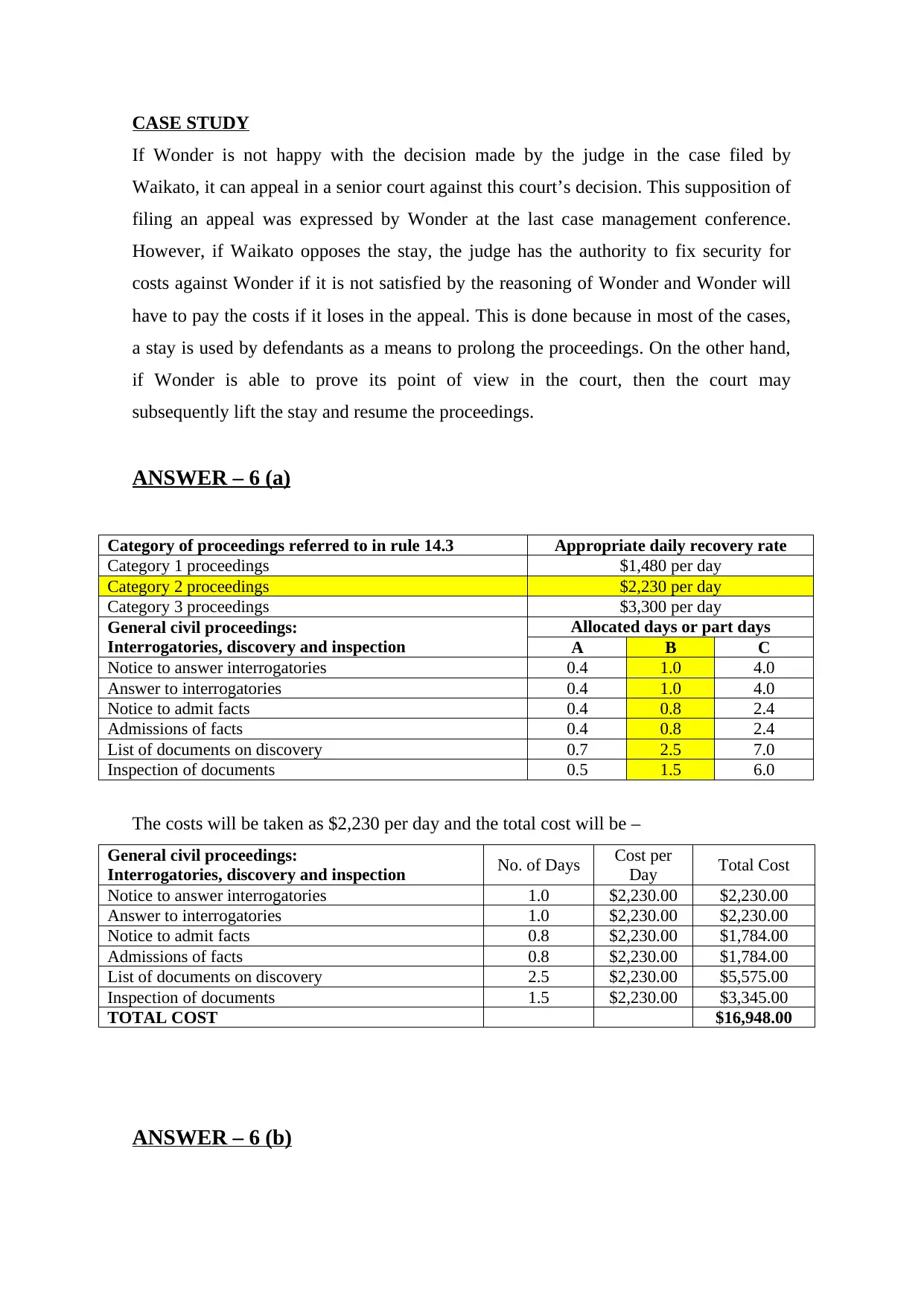
CASE STUDY
If Wonder is not happy with the decision made by the judge in the case filed by
Waikato, it can appeal in a senior court against this court’s decision. This supposition of
filing an appeal was expressed by Wonder at the last case management conference.
However, if Waikato opposes the stay, the judge has the authority to fix security for
costs against Wonder if it is not satisfied by the reasoning of Wonder and Wonder will
have to pay the costs if it loses in the appeal. This is done because in most of the cases,
a stay is used by defendants as a means to prolong the proceedings. On the other hand,
if Wonder is able to prove its point of view in the court, then the court may
subsequently lift the stay and resume the proceedings.
ANSWER – 6 (a)
Category of proceedings referred to in rule 14.3 Appropriate daily recovery rate
Category 1 proceedings $1,480 per day
Category 2 proceedings $2,230 per day
Category 3 proceedings $3,300 per day
General civil proceedings:
Interrogatories, discovery and inspection
Allocated days or part days
A B C
Notice to answer interrogatories 0.4 1.0 4.0
Answer to interrogatories 0.4 1.0 4.0
Notice to admit facts 0.4 0.8 2.4
Admissions of facts 0.4 0.8 2.4
List of documents on discovery 0.7 2.5 7.0
Inspection of documents 0.5 1.5 6.0
The costs will be taken as $2,230 per day and the total cost will be –
General civil proceedings:
Interrogatories, discovery and inspection No. of Days Cost per
Day Total Cost
Notice to answer interrogatories 1.0 $2,230.00 $2,230.00
Answer to interrogatories 1.0 $2,230.00 $2,230.00
Notice to admit facts 0.8 $2,230.00 $1,784.00
Admissions of facts 0.8 $2,230.00 $1,784.00
List of documents on discovery 2.5 $2,230.00 $5,575.00
Inspection of documents 1.5 $2,230.00 $3,345.00
TOTAL COST $16,948.00
ANSWER – 6 (b)
If Wonder is not happy with the decision made by the judge in the case filed by
Waikato, it can appeal in a senior court against this court’s decision. This supposition of
filing an appeal was expressed by Wonder at the last case management conference.
However, if Waikato opposes the stay, the judge has the authority to fix security for
costs against Wonder if it is not satisfied by the reasoning of Wonder and Wonder will
have to pay the costs if it loses in the appeal. This is done because in most of the cases,
a stay is used by defendants as a means to prolong the proceedings. On the other hand,
if Wonder is able to prove its point of view in the court, then the court may
subsequently lift the stay and resume the proceedings.
ANSWER – 6 (a)
Category of proceedings referred to in rule 14.3 Appropriate daily recovery rate
Category 1 proceedings $1,480 per day
Category 2 proceedings $2,230 per day
Category 3 proceedings $3,300 per day
General civil proceedings:
Interrogatories, discovery and inspection
Allocated days or part days
A B C
Notice to answer interrogatories 0.4 1.0 4.0
Answer to interrogatories 0.4 1.0 4.0
Notice to admit facts 0.4 0.8 2.4
Admissions of facts 0.4 0.8 2.4
List of documents on discovery 0.7 2.5 7.0
Inspection of documents 0.5 1.5 6.0
The costs will be taken as $2,230 per day and the total cost will be –
General civil proceedings:
Interrogatories, discovery and inspection No. of Days Cost per
Day Total Cost
Notice to answer interrogatories 1.0 $2,230.00 $2,230.00
Answer to interrogatories 1.0 $2,230.00 $2,230.00
Notice to admit facts 0.8 $2,230.00 $1,784.00
Admissions of facts 0.8 $2,230.00 $1,784.00
List of documents on discovery 2.5 $2,230.00 $5,575.00
Inspection of documents 1.5 $2,230.00 $3,345.00
TOTAL COST $16,948.00
ANSWER – 6 (b)
⊘ This is a preview!⊘
Do you want full access?
Subscribe today to unlock all pages.

Trusted by 1+ million students worldwide
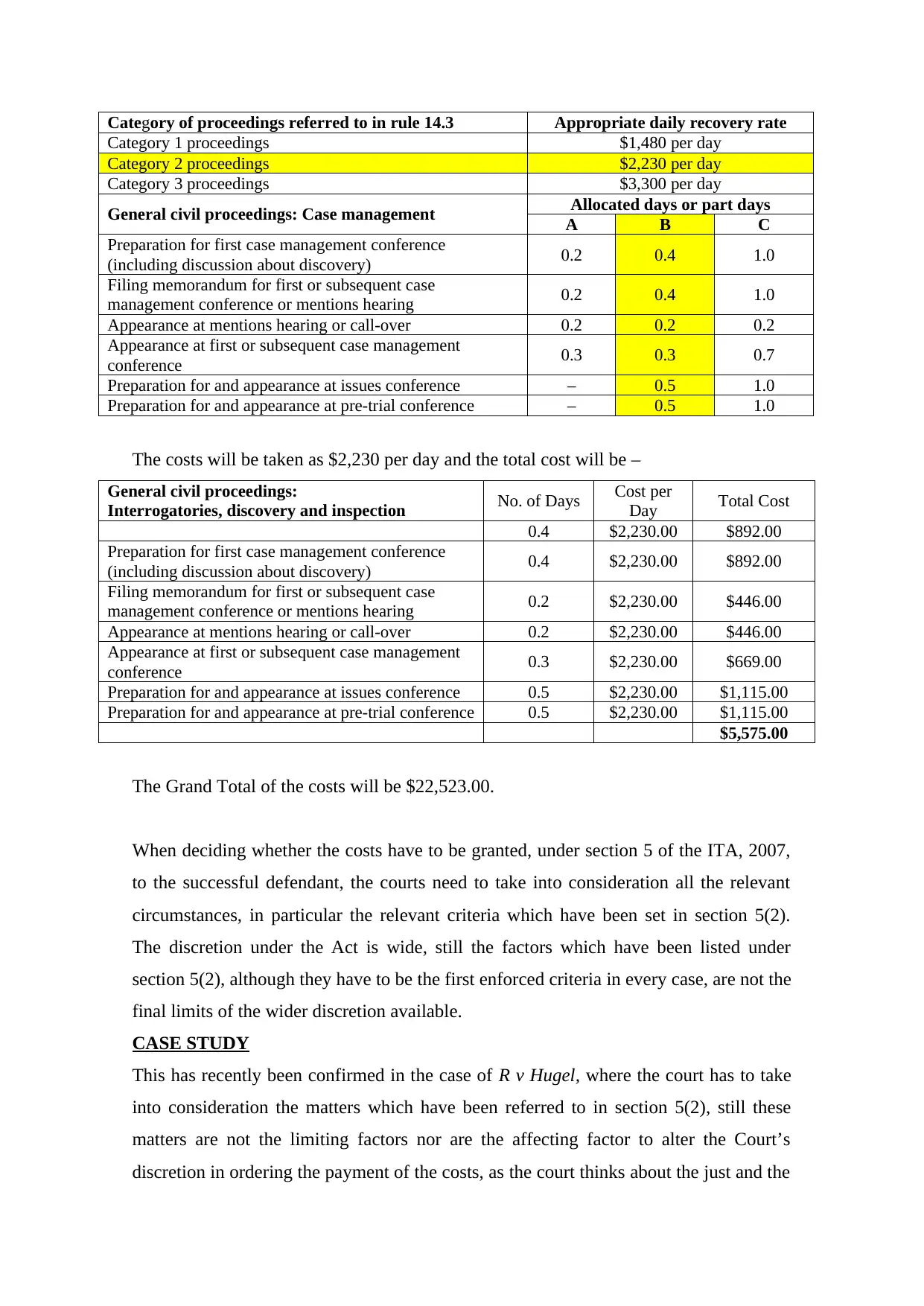
Category of proceedings referred to in rule 14.3 Appropriate daily recovery rate
Category 1 proceedings $1,480 per day
Category 2 proceedings $2,230 per day
Category 3 proceedings $3,300 per day
General civil proceedings: Case management Allocated days or part days
A B C
Preparation for first case management conference
(including discussion about discovery) 0.2 0.4 1.0
Filing memorandum for first or subsequent case
management conference or mentions hearing 0.2 0.4 1.0
Appearance at mentions hearing or call-over 0.2 0.2 0.2
Appearance at first or subsequent case management
conference 0.3 0.3 0.7
Preparation for and appearance at issues conference – 0.5 1.0
Preparation for and appearance at pre-trial conference – 0.5 1.0
The costs will be taken as $2,230 per day and the total cost will be –
General civil proceedings:
Interrogatories, discovery and inspection No. of Days Cost per
Day Total Cost
0.4 $2,230.00 $892.00
Preparation for first case management conference
(including discussion about discovery) 0.4 $2,230.00 $892.00
Filing memorandum for first or subsequent case
management conference or mentions hearing 0.2 $2,230.00 $446.00
Appearance at mentions hearing or call-over 0.2 $2,230.00 $446.00
Appearance at first or subsequent case management
conference 0.3 $2,230.00 $669.00
Preparation for and appearance at issues conference 0.5 $2,230.00 $1,115.00
Preparation for and appearance at pre-trial conference 0.5 $2,230.00 $1,115.00
$5,575.00
The Grand Total of the costs will be $22,523.00.
When deciding whether the costs have to be granted, under section 5 of the ITA, 2007,
to the successful defendant, the courts need to take into consideration all the relevant
circumstances, in particular the relevant criteria which have been set in section 5(2).
The discretion under the Act is wide, still the factors which have been listed under
section 5(2), although they have to be the first enforced criteria in every case, are not the
final limits of the wider discretion available.
CASE STUDY
This has recently been confirmed in the case of R v Hugel, where the court has to take
into consideration the matters which have been referred to in section 5(2), still these
matters are not the limiting factors nor are the affecting factor to alter the Court’s
discretion in ordering the payment of the costs, as the court thinks about the just and the
Category 1 proceedings $1,480 per day
Category 2 proceedings $2,230 per day
Category 3 proceedings $3,300 per day
General civil proceedings: Case management Allocated days or part days
A B C
Preparation for first case management conference
(including discussion about discovery) 0.2 0.4 1.0
Filing memorandum for first or subsequent case
management conference or mentions hearing 0.2 0.4 1.0
Appearance at mentions hearing or call-over 0.2 0.2 0.2
Appearance at first or subsequent case management
conference 0.3 0.3 0.7
Preparation for and appearance at issues conference – 0.5 1.0
Preparation for and appearance at pre-trial conference – 0.5 1.0
The costs will be taken as $2,230 per day and the total cost will be –
General civil proceedings:
Interrogatories, discovery and inspection No. of Days Cost per
Day Total Cost
0.4 $2,230.00 $892.00
Preparation for first case management conference
(including discussion about discovery) 0.4 $2,230.00 $892.00
Filing memorandum for first or subsequent case
management conference or mentions hearing 0.2 $2,230.00 $446.00
Appearance at mentions hearing or call-over 0.2 $2,230.00 $446.00
Appearance at first or subsequent case management
conference 0.3 $2,230.00 $669.00
Preparation for and appearance at issues conference 0.5 $2,230.00 $1,115.00
Preparation for and appearance at pre-trial conference 0.5 $2,230.00 $1,115.00
$5,575.00
The Grand Total of the costs will be $22,523.00.
When deciding whether the costs have to be granted, under section 5 of the ITA, 2007,
to the successful defendant, the courts need to take into consideration all the relevant
circumstances, in particular the relevant criteria which have been set in section 5(2).
The discretion under the Act is wide, still the factors which have been listed under
section 5(2), although they have to be the first enforced criteria in every case, are not the
final limits of the wider discretion available.
CASE STUDY
This has recently been confirmed in the case of R v Hugel, where the court has to take
into consideration the matters which have been referred to in section 5(2), still these
matters are not the limiting factors nor are the affecting factor to alter the Court’s
discretion in ordering the payment of the costs, as the court thinks about the just and the
Paraphrase This Document
Need a fresh take? Get an instant paraphrase of this document with our AI Paraphraser
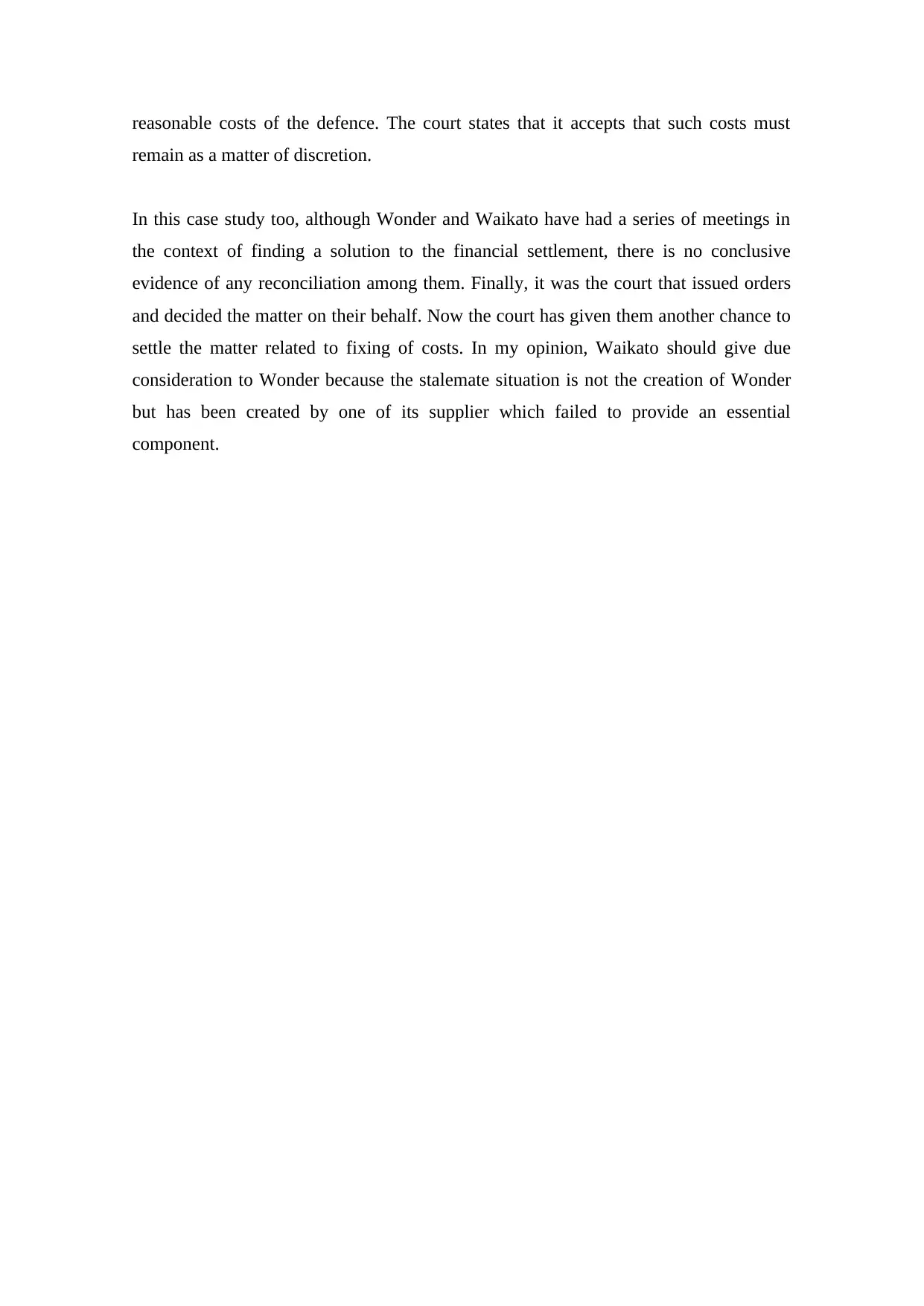
reasonable costs of the defence. The court states that it accepts that such costs must
remain as a matter of discretion.
In this case study too, although Wonder and Waikato have had a series of meetings in
the context of finding a solution to the financial settlement, there is no conclusive
evidence of any reconciliation among them. Finally, it was the court that issued orders
and decided the matter on their behalf. Now the court has given them another chance to
settle the matter related to fixing of costs. In my opinion, Waikato should give due
consideration to Wonder because the stalemate situation is not the creation of Wonder
but has been created by one of its supplier which failed to provide an essential
component.
remain as a matter of discretion.
In this case study too, although Wonder and Waikato have had a series of meetings in
the context of finding a solution to the financial settlement, there is no conclusive
evidence of any reconciliation among them. Finally, it was the court that issued orders
and decided the matter on their behalf. Now the court has given them another chance to
settle the matter related to fixing of costs. In my opinion, Waikato should give due
consideration to Wonder because the stalemate situation is not the creation of Wonder
but has been created by one of its supplier which failed to provide an essential
component.
1 out of 5
Your All-in-One AI-Powered Toolkit for Academic Success.
+13062052269
info@desklib.com
Available 24*7 on WhatsApp / Email
![[object Object]](/_next/static/media/star-bottom.7253800d.svg)
Unlock your academic potential
Copyright © 2020–2026 A2Z Services. All Rights Reserved. Developed and managed by ZUCOL.


